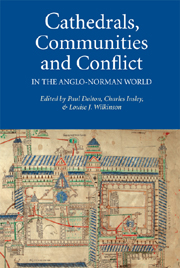Book contents
- Frontmatter
- Contents
- List of Illustrations
- List of Contributors
- Preface
- List of Abbreviations
- Introduction
- 1 The Dangers of Invention: The Sack of Canterbury, 1011, and the ‘theft’ of Dunstan's Relics
- 2 Remembering Communities Past: Exeter Cathedral in the Eleventh Century
- 3 Communities, Conflict and Episcopal Policy in the Diocese of Lichfield, 1050–1150
- 4 The Acta archiepiscoporum Rotomagensium and Urban Ecclesiastical Rivalry in Eleventh-Century Rouen
- 5 Cathedrals and the Cult of Saints in Eleventh-and twelfth-Century Wales
- 6 A Bishop and His Conflicts: Philip of Bayeux (1142–63)
- 7 Ecclesiastical Responses to War in king Stephen's Reign: The Communities of Selby Abbey, Pontefract Priory and York Cathedral
- 8 Secular Cathedrals and the Anglo-Norman Aristocracy
- 9 The Lives of Thomas Becket and the Church of Canterbury
- 10 Caught in the Cross-Fire: Patronage and Institutional Politics in Late twelfth-Century Canterbury
- 11 Crown, Cathedral and Conflict: King John and Canterbury
- 12 The English Monasteries and their French Possessions
- Index of People and Places
- Other Volumes in Studies in the History of Medieval Religion
2 - Remembering Communities Past: Exeter Cathedral in the Eleventh Century
Published online by Cambridge University Press: 12 September 2012
- Frontmatter
- Contents
- List of Illustrations
- List of Contributors
- Preface
- List of Abbreviations
- Introduction
- 1 The Dangers of Invention: The Sack of Canterbury, 1011, and the ‘theft’ of Dunstan's Relics
- 2 Remembering Communities Past: Exeter Cathedral in the Eleventh Century
- 3 Communities, Conflict and Episcopal Policy in the Diocese of Lichfield, 1050–1150
- 4 The Acta archiepiscoporum Rotomagensium and Urban Ecclesiastical Rivalry in Eleventh-Century Rouen
- 5 Cathedrals and the Cult of Saints in Eleventh-and twelfth-Century Wales
- 6 A Bishop and His Conflicts: Philip of Bayeux (1142–63)
- 7 Ecclesiastical Responses to War in king Stephen's Reign: The Communities of Selby Abbey, Pontefract Priory and York Cathedral
- 8 Secular Cathedrals and the Anglo-Norman Aristocracy
- 9 The Lives of Thomas Becket and the Church of Canterbury
- 10 Caught in the Cross-Fire: Patronage and Institutional Politics in Late twelfth-Century Canterbury
- 11 Crown, Cathedral and Conflict: King John and Canterbury
- 12 The English Monasteries and their French Possessions
- Index of People and Places
- Other Volumes in Studies in the History of Medieval Religion
Summary
The subject of ‘memory’ and ‘commemoration’ has become a popular field of study for medievalists over the last few years, often linked to the similarly fashionable subject of identity. Over the last ten or so years, through the work of scholars such as Chris Wickham and James Fentress, Michael Clanchy, Patrick Geary, Amy Remensnyder and Matthew Innes, we now have a greater and more nuanced appreciation of the role memory, remembrance, commemoration and the past played in early medieval societies, as well as the way in which these societies and communities set about constructing memoria and a sense of the past; how they remembered and how they forgot; and the structures and strategies individuals and communities used to remember. Historians no longer create an opposition between collective memory, seen as organic, social and non-constructed, and history, seen as a political, intentional and manipulative process. Equally, there is less of a tendency to equate oral culture with collective memory and written culture with history: it is undoubtedly true that the eleventh and twelfth centuries saw a great increase in the use of the written word but it is rather less clear whether this was accompanied by a transition between memory and history. Historians are aware that ‘memory’, whether individual or collective, could be every bit as deliberate and synthetic as ‘history’.
This work has opened our eyes to new ways of using particular types of evidence.
- Type
- Chapter
- Information
- Publisher: Boydell & BrewerPrint publication year: 2011



